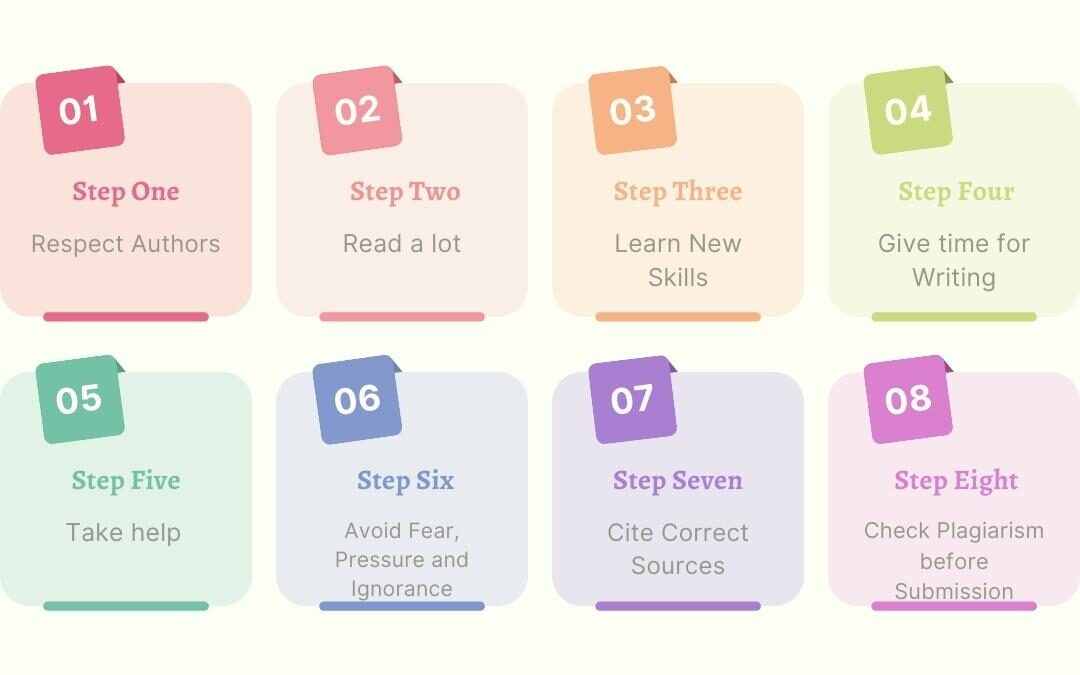How to Avoid Plagiarism?
Mainer times Scholars try their best to avoid Plagiarism while writing but due to lack of Knowledge or skills, they unintentionally end up in work which is considered Plagiarized. Ways to avoid Plagiarism involves properly citing the sources, using the citation method, which is suggested by your University or Journal in which you are planning to publish, writing in your own words using your own ideas after reading a lot of literature etc.
Here are some Tips for the Scolars on how to avoid plagiarism in research. We have tried to include all the steps to avoid plagiarism in this article. If you need more help, don’t hesitate to contact Us.

1) Respect authors who have done wonderful work
First, we should start respecting all authors who do hard work and write their original IDEAS, which helps society. We should put our feet in their shoes and think from their perspective:
How we are going to feel if we do a lot of hard work and write original IDEAS and someone uses it claiming it as their IDEAS and not giving credit to us?
It feels bad, Right? So let’s start respecting authors who do original work and try to be like them to earn respect from society.
2) Read a lot about your subject
Read as many books and articles as you can. Give a lot of time on reading relevant things related to your area of specialization. This will help you to understand the basics & you will develop deep insights into your topic. Because of your increasing understanding of the subject, you will automatically start getting new and original IDEAS, as you will continue reading more and more. So Remember, reading a lot is key to success. Remember to jot down your IDEAS in some diary and keep it safe.
3) Learn New Skills
- You may have to learn some new skills while doing research work like
- Learning a new language
- Learning proper citation style
- Proper use of Quotation marks (“ ”)
These skills are very essential for every scholar to avoid most of the mistakes, which happen unintentionally and count towards Plagiarism.
Let’s take an example of a scholar who has a lot of knowledge about the subject area but is not comfortable in the language in which he is writing his work. Therefore, he will not feel confident while writing and commit a lot of mistakes or will try to copy previously available written material which resembles his IDEA leading to Plagiarism. So learning a new language in which he has to write his work will help him to present his IDEAS effectively with confidence.
Similarly, Using proper use of Quotation marks (“ ”) is also a very essential skill that every scholar must possess. Whenever it is required to use any reference as it is written by the author, it should be enclosed in Quotation marks (“ ”) and credit should be given to the original author. This will help you avoid Plagiarism and make relevant points by using pre-existing work.
Different organizations have recommendations for their staff and students about which citation style should be used in a particular case and failing to use that recommended citation style can result in unwanted plagiarism. Similarly, Using proper citation style is also a necessary skill that every scholar must know.
4) Give proper time for writing Original IDEAS
- If you follow all 3 above given steps, the next step is to take your diary out in which you jotted down your IDEAS while reading literature about your subject. Review each IDEA carefully and write what you feel about the IDEA. Do not worry if you feel your thoughts have changed more than they were at a time when IDEA came into your mind. It shows your improved understanding of the subject.
5) Take help from Instructor or Guide
Whenever you have a doubt or are not able to understand any point, do not hesitate to ask for help from your instructor or guide. They are experts in subjects in which you are trying to be an expert so value them as the only way of getting proper guidance. Do not waste your most useful resource in your academic journey that is your Instructor or Guide
6) Do not let fear or pressure or ignorance push you towards wrong Direction
Fear, Pressure, and ignorance are enemies of man, whether he works in any field. I am sure if you follow all the above-given steps you will automatically get rid of these three curses. Let me tell you how:
- If you are reading a lot, and learning new skills, it means you got rid of ignorance.
- If you are reading a lot, you gain a lot of knowledge as well as learning new skills will give you confidence, and it means you got rid of fear.
- As you become a more knowledgeable person with new skills and a lot of confidence and new ideas, It will automatically relieve pressure from you.
7) Always keep track of right Source while referring to any existing work
Scholars have to refer to pre-existing work in many instances, which cannot be avoided. Sometimes scholars mix up between referred work and the referred author. This may happen by mistake because a lot of references are used in literature but remember this also counts towards Plagiarism. It is considered plagiarism in academics because the right author is not getting credit when his work is being referred which is an injustice to him because his work is his intellectual property. So always, keep track of the source with great care while referring to any existing work to avoid this unnecessary plagiarism.
Despite taking all precautions to avoid Plagiarism while writing academic content, it is very likely to commit mistakes. Therefore, a scholar should thoroughly check his work before submission to be 100% sure that all work is presented adequately while using correct and legitimate language, using a proper citation style, using proper Quotation marks, and giving credit to the right author for every reference. After manually checking your work, you can go checking through tools like Turnitin, Ithenticate, or Ourignal (previously Urkund), etc. to check their report and make corrections if any.
One thing to remember without any mistakes is whether you use any tool of your choice; make sure that repositories are not turned on while checking. If repositories are on while checking, the tool will store your work and when your organization will check your work at their level, it will show 100% plagiarism. So you will not only lose your original hard work but also may face consequences as per the Government’s and your Organization’s guidelines against Plagiarism. So Using such tools is important, but they should be used with utmost care.
How to avoid plagiarism?


